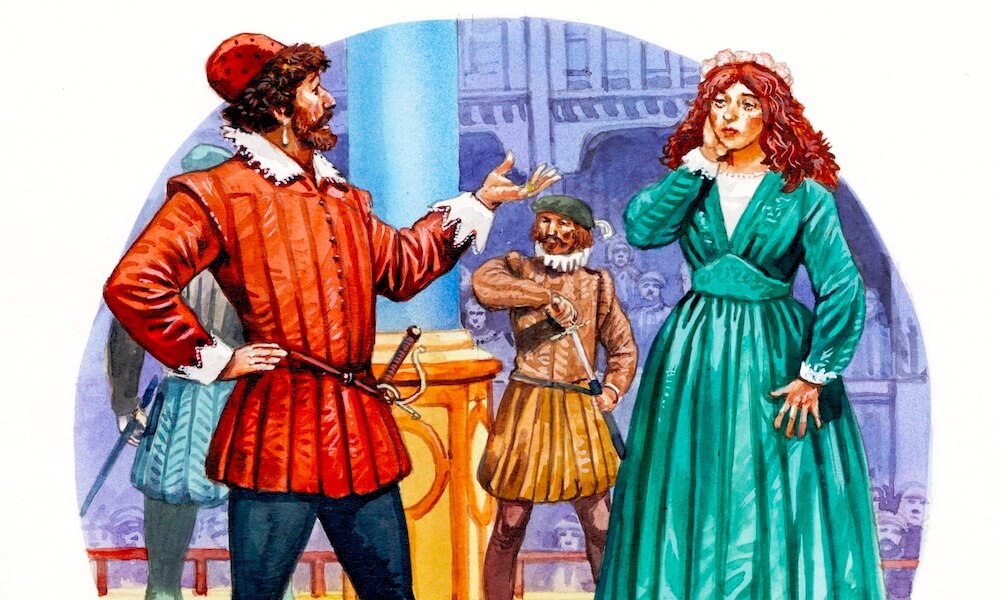The floor of St George’s Guildhall, strolled on by actors and theatergoers for centuries, reveals information about how people in Shakespeare’s day spent their time at the theater.


The floor of St George’s Guildhall, strolled on by actors and theatergoers for centuries, reveals information about how people in Shakespeare’s day spent their time at the theater.

Could one of the world’s most celebrated love poems actually be about politics? A discovery, made in the depths of the Oxford library, sheds light on the history behind Sonnet 116.

The reconstructed Globe Theatre, completed in the 1990’s serves as a living tool to explore how Shakespeare’s plays were originally performed and experienced.

William Shakespeare is widely considered to be the greatest writer in the English language and now, thanks to modern technology, you can explore some of the most iconic places from the playwright’s life, and the locations said to have inspired him, from the comfort of your own home.

St. George’s Guildhall, the oldest standing theatre in England, is a place where actors have gathered and preformed for centuries. Read about a recent discovery made there and its potential link to Shakespeare.

Some scholars of Shakespeare question the identity of the beloved playwright. This article discusses facts that have led some to believe The Merry Wives of Windsor was written by a different author.

Judi Dench is known for her legendary performances both on-stage and on-screen. Read this article to learn how Shakespeare influenced Dench throughout her life and career.

Attention, Shakespeare enthusiasts everywhere! The bard’s birthday is coming up on April 23rd. Check out this link to get some fun ideas for your Shakespeare celebration.

The winner of this year’s TS Eliot prize explores how race, masculinity, and immigration influence his understanding of Othello, one of Shakespeare’s most iconic characters.

Several Shakespearean plots points, including the climax of Romeo and Juliet, focus on powerful potions. Did the bard dream them up, or might they have really existed?

Theater plays a significant role in cultures around the world. Shakespeare Studies professor, Nicoleta Cinpoeş, experienced this fact first-hand as she watched a production of Romeo and Juliet staged in a bomb shelter.

Shakespeare, an iconic figure in English history, is celebrated and beloved by another significant English figure, King Charles. Read about how and why King Charles celebrates the 400-year anniversary of Shakespeare’s First Folio.

Centuries after they were written, Shakespeare’s words remain poignant as we honor veterans on Memorial Day.

Many of Shakespeare’s works might be lost to us forever had they not been preserved in a collection of published manuscripts known as the First Folio.

Today we study Shakespeare in school and often see his plays in formal settings, but is that how they were meant to be experienced? Learn more about what going to see a play was really like when Shakespeare’s theater company put them on stage for the first time.

It’s not likely that you think of Shakespeare and video games at the same time, but that may be about to change!

In 2010, a modern version of The Tragedy of Macbeth appeared on PBS’s Great Performances. The star of that groundbreaking production, Sir Patrick Stewart, discusses the choices he and director Rupert Goold made to bring Shakespeare’s work to life on the small screen.

Shakespeare gets his sea legs as the Royal Shakespeare Company preforms iconic scenes aboard cruise ships.

Read about the women who edited and retold Shakespeare throughout the centuries as well as their impact on Shakespearean scholars today.

Shakespeare’s line, “Macbeth doth murder sleep”—and his guilt-ridden, sleepwalking Lady Macbeth—made a link between psychological distress and troubled sleep. Recent research shows that the Bard was onto something.